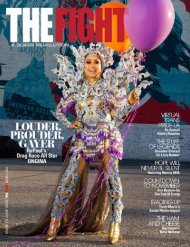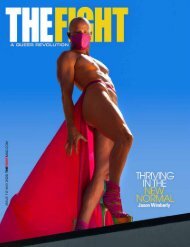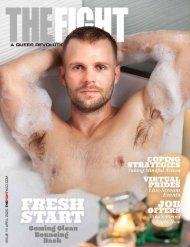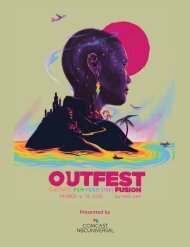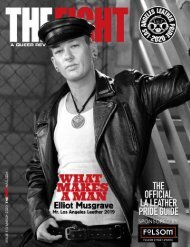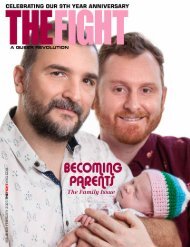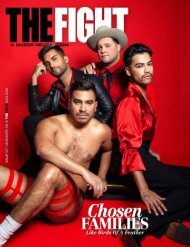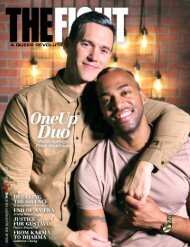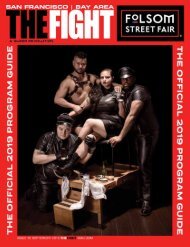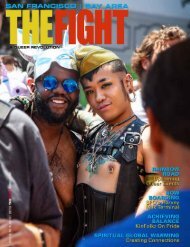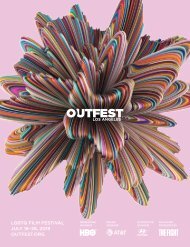You also want an ePaper? Increase the reach of your titles
YUMPU automatically turns print PDFs into web optimized ePapers that Google loves.
PSYCHOLOGICAL DISTRESS<br />
According to a 2015 national survey conducted<br />
by the Substance Abuse and Mental<br />
Health Services Administration lesbian, gay<br />
or bisexual adults have a much higher rate<br />
of substance use and mental health issues<br />
than the heterosexual population. One of their<br />
findings, for example, was that 39.1 percent of<br />
LGB adults used illicit drugs in the past year<br />
when compared with 17.1 percent of the heterosexual<br />
population. Also, 37.4 sexual minority<br />
adults had any mental illness as compared<br />
with 17.1 percent of the heterosexual adult<br />
“YOU DESERVE TO<br />
LEARN HEALTHIER<br />
COPING STRATEGIES,<br />
HEAL OLD WOUNDS,<br />
LEARN MORE ABOUT<br />
YOURSELF AND HOW<br />
TO BETTER NAVIGATE<br />
A SOMETIMES<br />
HOSTILE WORLD.”<br />
population. These numbers break out even<br />
further as it relates to age, race and ethnicity.<br />
Rates for mental health issues and addiction<br />
are also staggering for the transgender community.<br />
According to the 2015 US Transgender<br />
Survey Report, 39% of respondents experienced<br />
serious psychological distress in the<br />
month before taking the survey with 40%<br />
having attempted suicide in their lifetime, almost<br />
nine times the rate of the US population.<br />
Transgender women of color face the most<br />
pervasive forms of discrimination that have a<br />
direct impact on their health and well-being.<br />
There are multiple reasons why there’s a<br />
higher prevalence of substance use and addictions<br />
in our <strong>LGBTQ</strong> Community. The obvious<br />
overarching explanation is minority stress<br />
experienced with being scapegoated by society<br />
for our differences. We have been demeaned,<br />
devalued, ridiculed, patronized, blamed, incessantly<br />
criticized, and have also experience<br />
cultural sexual shaming for our very beingness.<br />
These are all qualities of an abusive relationship<br />
that we’ve been forced to experience first-hand<br />
or as a byproduct of being an oppressed minority.<br />
Who wouldn’t feel depressed, anxious or<br />
have a myriad of other mental health issues as<br />
a result of being in a toxic relationship that you<br />
can’t fully insulate yourself from and is ongoing?<br />
When we want to feel relief, a sense of<br />
belonging, pleasure, or confidence we can<br />
turn to a temporary fix outside of ourselves,<br />
drugs. Illegal and prescription drugs can be<br />
used in ways that medicate and/or increase<br />
our psychological/emotional distress. At their<br />
best, they can give a temporary reprieve from<br />
what ails us in order to look more deeply at<br />
the underlying causes, to treat these. They can<br />
show us a window into what’s possible so that<br />
we can have this without them. At their worst,<br />
they can become a nightmare that adds additional<br />
shame, isolation and self-rejection.<br />
TREATMENT APPROACHES<br />
So what is the best treatment approach for<br />
dual diagnosis in the <strong>LGBTQ</strong> Community?<br />
One size definitely does NOT fit all when<br />
it comes to our needs as a community.<br />
There are several options when it comes to<br />
treatment of addictions: support groups, outpatient<br />
treatment, inpatient treatment, detox<br />
and residential care. Which one will work<br />
best really depends on finding the right fit<br />
with where someone is at and the particular<br />
treatment programs involved.<br />
While the twelve-step recovery program<br />
works great for many and certainly has the largest<br />
amount of groups of any treatment program,<br />
others find it further perpetuates their shame<br />
or is overall unhelpful (some estimates of its<br />
effectiveness are as low as 5%—8% of those<br />
who participate). There are also other treatment<br />
approaches that work better for some: like Harm<br />
Reduction, SMART Recovery, LifeRing Secular<br />
Recovery, and Moderation Management.<br />
Similarly to recovery programs, there are<br />
also many approaches to providing psychotherapy<br />
including: Cognitive-Behavioral<br />
Therapy (CBT), Psychodynamic Therapy,<br />
Humanistic Therapy, Narrative Therapy and<br />
Hakomi Therapy. However, the single most<br />
important factor of effective psychotherapy is<br />
not the treatment approach but the relationship<br />
between therapist and client. This<br />
transformational relationship can provide<br />
the safety, support, validation and guidance<br />
that’s too often missing for <strong>LGBTQ</strong> people.<br />
Being a good consumer of mental health and<br />
addiction services means doing your research.<br />
Unfortunately, all too often I see conversion<br />
therapists masquerading by “specializing with<br />
the <strong>LGBTQ</strong> community,” but would rather<br />
change the client to becoming cis-gender and<br />
straight, something that has been deemed ineffective,<br />
harmful and dangerous by mental health<br />
and medical professional associations.<br />
Lastly, finding a therapist and/or treatment<br />
program requires these services to not only<br />
be <strong>LGBTQ</strong>-friendly but actually knowledgable,<br />
in order to get the most effective care.<br />
It’s not your job to pay for a service but then<br />
end up spending too much time educating<br />
them about what it means to be <strong>LGBTQ</strong>. You<br />
deserve to learn healthier coping strategies,<br />
heal old wounds, learn more about yourself<br />
and how to better navigate a sometimes<br />
hostile world. You deserve to thrive, love and<br />
enjoy your life more fully.<br />
James Guay, Licensed Marriage<br />
and Family Therapist (#39252), has<br />
provided individual and couples<br />
counseling in private practice<br />
since 1999. A former elite Gymnast and life-long<br />
lover of nature, he focuses his social justice<br />
activism for the <strong>LGBTQ</strong> population. Digital<br />
content available at: www.livingmorefully.com.<br />
Instagram: @jamesguaylmft<br />
<strong>SEPTEMBER</strong> <strong>2019</strong> | <strong>THE</strong> <strong>FIGHT</strong> 31



